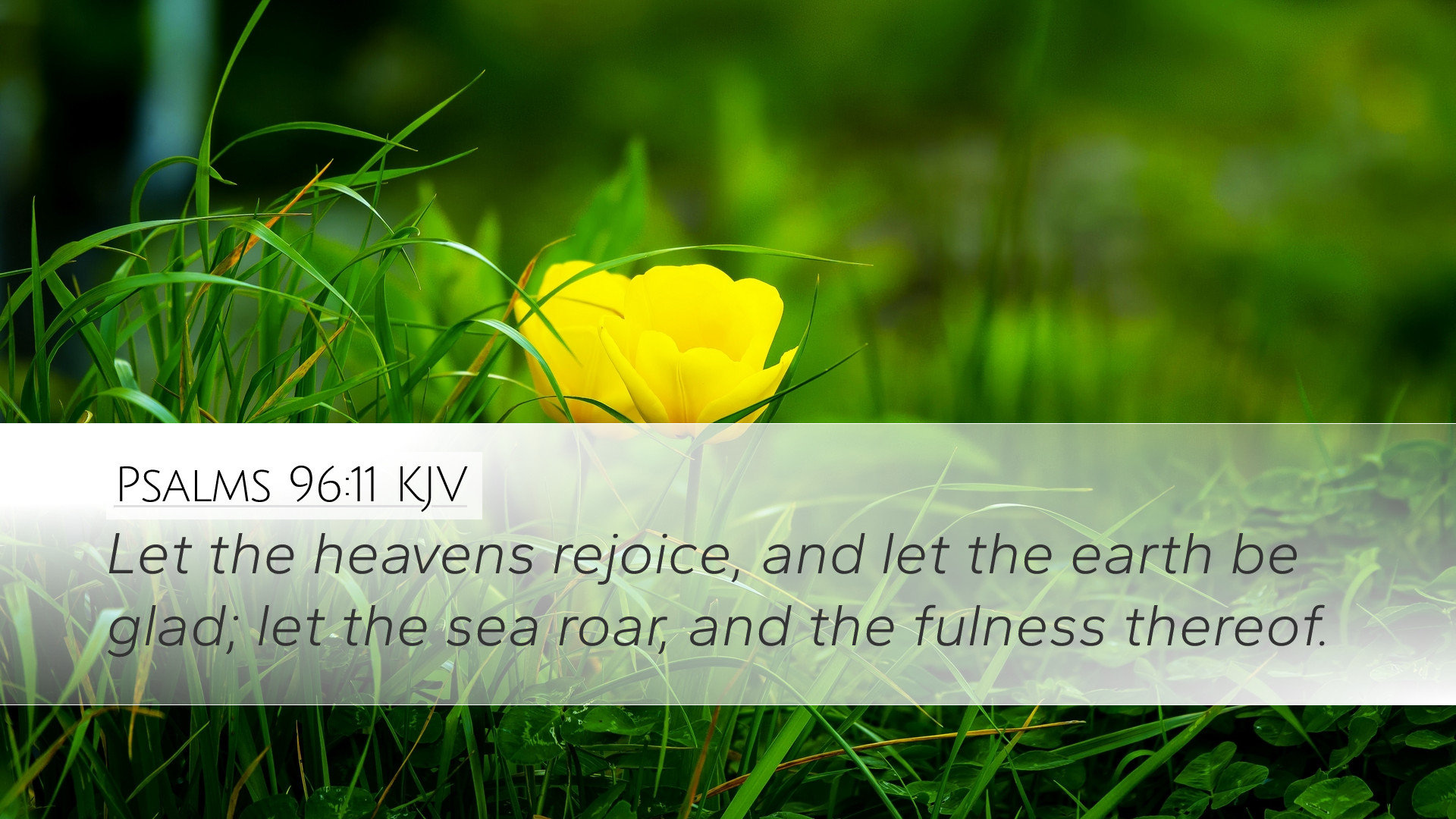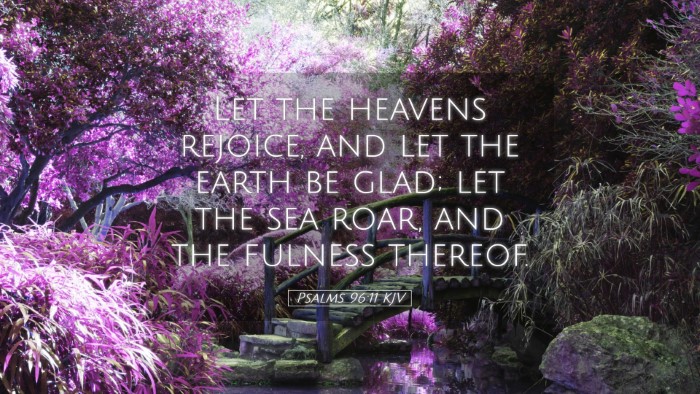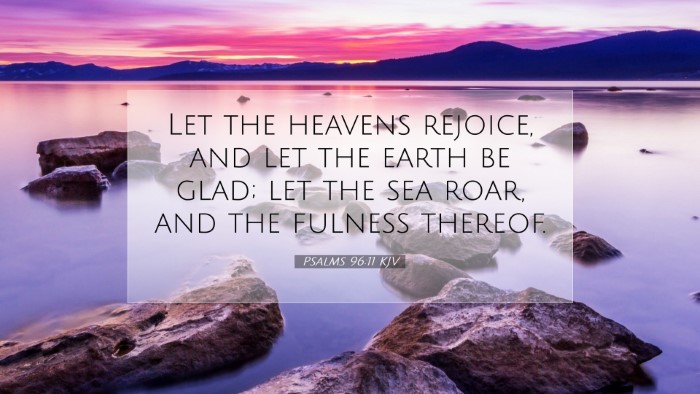Psalms 96:11 Commentary
Bible Verse: "Let the heavens rejoice, and let the earth be glad; let the sea roar, and the fulness thereof."
Introduction
The verse from Psalms 96:11 invites a cosmic celebration of God's reign and His creative power. It highlights the joyous response of creation to the presence and authority of God. This commentary draws insights from well-respected public domain commentaries by Matthew Henry, Albert Barnes, and Adam Clarke, providing a rich tapestry of interpretation for pastors, students, theologians, and scholars.
Contextual Analysis
Psalms 96 is a part of the enthronement psalms, which celebrate God as King and His rightful authority over all creation. This psalm calls not only God’s people but all of creation to acknowledge His reign with joy. The verse serves as an exhortation, encouraging an active participation in the glorification of God through praise.
Linguistic and Thematic Insights
Matthew Henry emphasizes the imperative nature of the calls to rejoice. The verse is structured as a command, reflecting the natural response of creation to its Creator's glory. Henry articulates that such a jubilant expression is not only appropriate but necessary, highlighting the interconnectedness of heaven and earth in their recognition of divine sovereignty.
Albert Barnes further elucidates the semantic richness of the imagery in this verse. The phrase "let the heavens rejoice" echoes in the biblical narrative where celestial bodies reflect the glory of God (cf. Psalms 19:1). Barnes indicates the call here transcends mere human emotion, entrusting to the entirety of creation a role in praising God.
The Nature of Joy in Creation
Joy in the Heavens: The heavens rejoicing is a personification of celestial bodies. Adam Clarke explains that the heavens, metaphorically speaking, represent both the physical sky and the angelic beings dwelling therein. Their rejoicing signifies acknowledgment of God's majesty and power.
Joy on Earth: Next, the earth’s gladness mirrors this heavenly joy. Matthew Henry notes that the earth should reflect divine attributes through its beauty and bounty, recognizing that all creation serves and is sustained by God's hand.
The Sea’s Role in the Celebration
When the psalmist moves to declare that "let the sea roar, and the fulness thereof," it emphasizes the vastness and power of God's creation. Albert Barnes recognizes the sea as a metaphor for the untamed and powerful aspects of nature that also join in the hymn of praise to God. The roaring of the sea symbolizes both turmoil and joy, suggesting that even in chaos, God's presence brings peace and order.
Symbolism in Biblical Context
Clarke notes that the image of the sea can relate to the collective response of mankind and nature. As the waters surge, so do the hearts of those who recognize God’s sovereignty, embracing both praise and fear of His wonders. The 'fulness' suggests abundance, hinting at the overflow of blessings found in creation, which all testify to His glory.
Theological Implications
This verse propounds significant theological implications about the interaction between God, humanity, and creation.
-
The Sovereignty of God:
God's reign over all the earth, as presented in the psalm, illustrates His sovereign authority. Both Matthew Henry and Adam Clarke assert that recognition of God’s sovereignty should elicit both joy and a sense of responsibility from believers to testify to His greatness.
-
The Unity of Creation:
This psalm beautifully depicts the unity within creation itself. As Henry expresses, the joyful celebration of the heavens, the earth, and the sea underscores a harmonious creation that praises its Creator in a unified voice.
-
The Call to Worship:
The psalmist extends an invitation for worship. The joy expressed in this verse serves as both a call and a response to God's presence. Worship should reflect an engagement with the beauty of creation, leading to a heartfelt response as emphasized by Barnes.
Pastoral Applications
For pastors and church leaders, the celebration suggested within Psalms 96:11 offers profound applications:
-
Encouraging Congregational Worship:
Pastors may utilize this passage to encourage congregations to engage in joyful worship that acknowledges God's majesty, creating an environment where the community can rejoice together.
-
Emphasizing Creation Care:
Psalms 96:11's celebration of creation can guide sermons on environmental stewardship, teaching that caring for creation is a response to God's law and love.
-
Implementing Inclusive Celebrations:
Recognizing all creation in worship can remind congregations to celebrate diversity, inviting all voices to join in the praise of God, reflecting the inclusivity of the Kingdom of God.
Conclusion
Psalms 96:11 is a vibrant declaration of joy and reverence towards God, encapsulating the response of creation to its Creator. Through the insights of Henry, Barnes, and Clarke, one can glean the intricacies of this verse regarding the nature of God's sovereignty, the unity of creation, and a call to heartfelt worship. This text serves as a compelling reminder for all believers to engage deeply with the joy of creation as we glorify our God.


